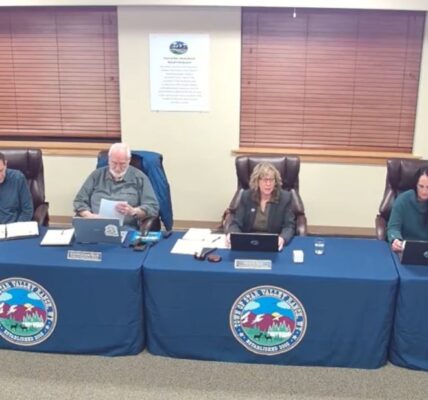By Mike Koshmri
Jackson Hole News&Guide
Via- Wyoming News Exchange

A former federal wildlife health chief says the National Elk Refuge’s plans to reduce feeding are “likely to fail” and it’s doubtful they’d slow the spread of disease.
It would be better to start the planning process from scratch, says U.S. Fish and Wildlife Service retiree Tom Roffe, who personally worked the elk feeding issue “for decades.” Roffe summarized his concerns in a 17-page review of the refuge’s “step-down” plan that he submitted last fall, while the plans were in draft form. The plans are now final and facing a lawsuit.
Roffe told the News&Guide in an interview that he views the step-down plan as essentially a “delay” tactic with no chance of success.
“It’s laudable they try to do this,” Roffe said, “but the constraints upon the step-down plan by the bison and elk management plan — near the end of its lifespan — are simply insurmountable.”
“What they wrote here, honestly looks like a delaying tactic to me,” he said. “You have a 15-year plan that is 13 years into the running, and so the plan is due for review in 2022. Yet they issue the step-down plan that requires, according to their statement, a minimum of five years — and more realistically a decade — to prove its efficacy.”
Trends from the past decade have hurt the National Elk Refuge’s chances at achieving its 13-year-old marching orders to reduce feeding. The Jackson herd is right around its 11,000-animal goal — which is included in the 2007 plan — but the herd has redistributed, and in some recent winters the herd has relied more on the refuge than at any point in its history.
While Roffe was employed by Fish and Wildlife, his technical reports went into the 2007 “bison and elk management plan” that established goals the step-down plan seeks to meet. Those objectives include achieving a no-feeding regime during average-severity winters. The document also set goals for habitat conservation, elk and bison populations (5,000 and 500) and disease management.
The step-down plan is narrower, and the issues of elk distribution and disease are considered outside its scope.
“Management attempts to reduce reliance on feeding are severely limited by this approach,” Roffe wrote in his review.
Because the step-down plans don’t delve into approaches and strategies that would enhance the chance of success, he argues it would better to begin a “comprehensive review” of the 2007 bison and elk plan — and to start that process this year.
Proposed changes to the 108-year-old refuge feeding program have been contested by the state of Wyoming and its Game and Fish Department, which haggled over the modifications and requested changes to the draft plans for years. Game and Fish Commissioner and La Barge resident Mike Schmid told the News&Guide Tuesday that he doesn’t see the need for any change.
“I’m just not in agreement with shutting down the feeding there on the refuge,” Schmid said. “I think it’s a Jackson Hole institution, and I think a lot of people enjoy that and a lot of tourism revolves around that.”
Schmid also disagrees with the modest changes contemplated by the step-down plan because, he said, they move the refuge in a no-feeding direction. The plans start with taking elk off alfalfa earlier in the spring, by about a week. The overall goal is to reduce bison and elk “fed days” — the number of animals multiplied by the number of days they’re fed — by 50%.
Roffe’s critique was prepared on behalf of Earthjustice, the environmental law firm that’s suing the refuge for allegedly violating a judge’s ruling and an array of federal laws.
Earthjustice’s lawsuit cites Roffe’s critique several times, criticizing Fish and Wildlife for deference to the state while ignoring advice from a former employee.
“The agency’s step-down plan defines success at a level of reduced feeding that would still leave nearly half of the Jackson elk herd — 5,000 elk — densely concentrated on artificial feedlines for more than 50 days each winter,” Earthjustice’s complaint states. “According to Dr. Thomas Roffe … this level of artificial feeding ‘still leaves a substantial risk of catastrophic disease propagation’ in the Jackson elk herd.
Nevertheless, the service failed to consider this critical issue, much less to heed, or even acknowledge, Dr. Roffe’s warning.”
The complaint was filed on behalf of the Sierra Club, the National Wildlife Refuge Association and Defenders of Wildlife and asks a federal judge to force the Fish and Wildlife Service to compel a “lawful, objective and science-based plan” to phase out the 108-year-old feeding program “within the shortest practicable period of time.”
Roffe’s critique faults the refuge step-down plan for not establishing goals for disease spread and prevalence. A separate plan is in the works on that front, but it has not been publicized.
“The step-down plan simply assumes all disease is density dependent and any reduction in feeding reduces density thereby reducing disease prevalence and transmission risk,” Roffe wrote. “However, this simplistic assumption is unlikely valid.”
Diseases are unique, and each has its own “certain lower threshold” of density necessary for transmission to be significantly interrupted, the critique says.
Chronic wasting disease, first found in Jackson Hole in fall 2018, is one malady that he argues is not being properly prepared for.
“Chronic wasting disease, the problem with it is it’s a chronic, slow, insidious creeping disease,” Roffe said in the interview. “It moves through slowly. … and it’s on a protracted, decades-long epidemic curve.”
Roffe recommended that state and federal agencies continue working together to come up with a plan that eliminates feeding and is acceptable to all parties involved. If that effort fails, he said, the federal government should pursue its goals on its own.
“As unpalatable as it sounds, the refuge and [Grand Teton National Park] should unilaterally undertake a program to decrease and eliminate wildlife feeding in the foreseeable future,” Roffe said. “I told them that back in 2007.”
The “backbone” to go at it alone, Roffe said, seems to be lacking. If collaboration on the feeding plans leads the Fish and Wildlife Service toward policies that are incompatible with its mission and guiding laws, he said, the federal government might as well give the state of Wyoming the National Elk Refuge.
“Don’t make it a Fish and Wildlife Service refuge,” Roffe said. “Make it an elk-feeding ground run by the state of Wyoming.”






